
Night by Elie Wiesel is a gripping tale that explores the core of what it means to be human and the struggle to survive against an overwhelming, malevolent force. In this powerful memoir, Wiesel recounts his experiences during the Holocaust as a Jewish teen simply hoping to survive and stay together with his family.
I believe it was the story-like conveyance of Wiesel’s experiences that made this novel so evocative. For instance, the author describes how, seeing the Jewish families and other children depart for a ghetto, he and his siblings would gather water throughout the day to make sure the families wouldn’t grow too dehydrated. In another part of the novel, Wiesel describes how one teenager was so starved as to fight his own father for a piece of bread. He even talks about how he was tempted to take his father’s food rations when his father was very sick and a stranger in his camp told Wiesel that feeding his father was pointless.
It was truly appalling to see the sheer horrors and crimes that the Nazis inflicted on the Jewish people, and it will always be a shock to my core no matter how many times I read accounts of the Holocaust. The fact that a human being could do that to another is simply beyond me; I struggle with even harming insects in my house. It truly made me think about so many things on so many levels. What does and can fear make us do to others? Did people really believe Hitler’s scapegoating of Jewish people, or did they just want to vent their anger toward something? Why have Jewish people been scapegoated so often throughout history? Can I be as selfless and kind of a human being as Elie was in a situation similar to him? And so on.
An interesting character development I observed in Elie was the shift in his level of devotion towards his faith and religion throughout the memoir. While at the inception of Night, Elie is depicted as praying fervently and even crying as a result of the deep emotions he feels from worshipping his God, he increasingly questions the existence of that God as he observes more and more horrors committed by the Nazis.
This is one of the few books that I think has truly changed me as a person and moved me very deeply on an emotional level. While it is very dark and somber throughout, this sort of tone and mood are the only appropriate ones for a book of this nature, and it helps highlight the moments of kindness and humanity that appeared throughout. For some to have the audacity to suggest that the Holocaust did not even occur is truly disheartening, depressing, and angering at the same time. It is clear that this is a period in our history that we should truly learn from and never forget. Elie Wiesel’s tale recounts the Holocaust in a way that is very different from other Holocaust-related literature such as The Boy in the Striped Pajamas and The Diary of Anne Frank, but they all tell a common story of immense human suffering and loss. The fact that Elie and other Jewish people had to live through that experience is deeply disturbing.

Review by ~ Andrew
SHARE THIS: